
In-Home Drug Testing ,
Instant Results - Accurate- Convenient
Accredited Drug Testing offers self-administered/self-collection drug testing products in , for employers that need On The Job Testing, In-Home Personal Use or for Family Testing Purposes. Our in-home/self-administered rapid drug testing options are a cost-effective alternative when needing to test an employee, individual, or family member when visiting a testing center is not convenient and you are in need of a reliable rapid baseline result. Call us today to order your instant testing devices or simply place your order below. All instant testing devices are FDA approved. The initial screen is used as an initial screening and it is recommended that all positive results should be confirmed by a certified laboratory. All Negative results are conclusive.
Instant Test Products
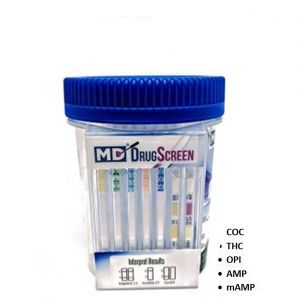
5 Panel Rapid Result
Our 5 panel rapid results is the most common urine drug test utilized for baseline testing. This drug test screens for the most commonly abused "street" drugs and is the most common utilized by employers and individuals.
5 Panel Instant Cup Screens For:
- Amphetamines (Methamphetamines is included)
- Cocaine
- Marijuana
- Opiates
- Codeine
- Morphine
- Heroin
- Phencyclidine (PCP)
Urine Cut-Off Levels
AMP 1000ng/mL, COC 300 ng/mL, OPI 2000 ng/mL, PCP 25 ng/mL, THC 50ng/mL
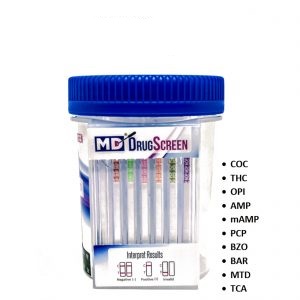
10 Panel Rapid Result
The 10-panel rapid results drug testing cup is a rapid test for the detection of the commonly abused "street" drug and prescription medication. The 10 panel is utilized by employers and individuals when they are in need of a more comprehensive result than the 5-panel drug test.
10 panel Instant Cup Screens For:
- Amphetamines (Methamphetamines is included)
- Cocaine
- Marijuana
- Opiates
- Codeine
- Morphine
- Heroin
- Phencyclidine (PCP)
- Benzodiazepines
- Barbiturates
- Methadone
- Tricyclic Antidepressants (TCA)
Urine Cut-Off Levels
AMP 1000ng/mL, BAR 300 ng/mL, BZO 300 ng/mL, COC 300 ng/mL, mAMP 1000 ng/mL, MTD 500 ng/mL, OPI 2000 ng/mL, PCP 25 ng/mL, TCA 1000ng/mL, THC 50ng/mL
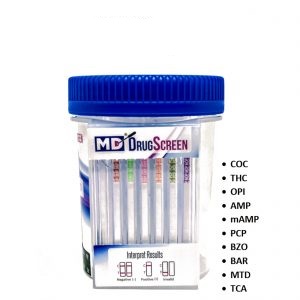
12 Panel Rapid Result
The 12-panel rapid results drug test screens for the presence of 12 different metabolites to provide simple, fast and accurate results. This test is often used for comprehensive testing that must include additional drugs not screened for in the 10-panel rapid test.
12 Panel Instant Cup Screens For:
- Amphetamines (Methamphetamines is included)
- Cocaine
- Marijuana
- Opiates
- Codeine
- Morphine
- Heroin
- Phencyclidine (PCP)
- Benzodiazepines
- Barbiturates
- Methadone
- MDMA
- Oxycodone
- Methadone
- Buprenorphine-Suboxone
Urine Cut-Off Levels
AMP 1000ng/mL, BAR 300 ng/mL, BUP 5 ng/mL, BZO 300 ng/mL, COC 300 ng/mL, mAMP 1000 ng/mL, MDMA 500 ng/mL, MOP 300ng/mL, MTD 500 ng/mL, OXY 100 ng/mL, PCP 25 ng/mL, THC 50ng/mL
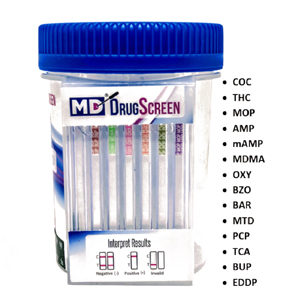
14 Panel Rapid Result
The 14-panel rapid results drug test is currently the most comprehensive instant drug test available. This rapid test will provide you with a broad range of drug metabolites to ensure the most comprehensive in-home drug test result.
14 Panel Instant Cup Screens For:
- Amphetamines (Methamphetamines is included)
- Cocaine
- Marijuana
- Opiates
- Codeine
- Morphine
- Heroin
- Phencyclidine (PCP)
- Benzodiazepines
- Barbiturates
- Methadone
- MDMA
- Oxycodone
- Methadone
- Buprenorphine-Suboxone
- Tricyclic Anti-Depressants,
- EDDP
Urine Cut-Off Levels
AMP 1000ng/mL, BAR 300 ng/mL, BUP 5 ng/mL, BZO 300 ng/mL, COC 300 ng/mL, EDDP, mAMP 1000 ng/mL, MDMA 500 ng/mL, MOP 300ng/mL, MTD 500 ng/mL, OXY 100 ng/mL, PCP 25 ng/mL, TCA 1000ng/mL, THC 50ng/mL
Additional Screening Options
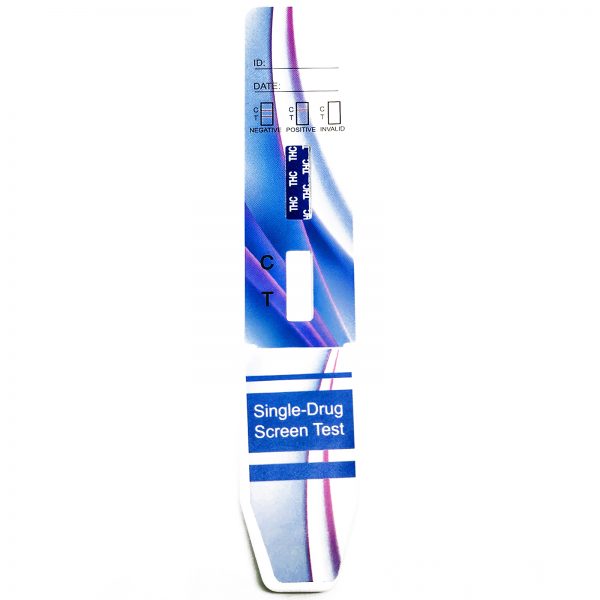
Marijuana Only (THC) Instant
This single dip rapid result test screens for the presence of THC metabolites. Simple 2 step process (dip and read), results within 5 minutes or less.
Urine Cut-Off Levels
50 ng/mL cutoff level

Nicotine (Cotinine) Instant
This single use dip rapid result test screens for the presence of nicotine and cotinine metabolites in urine. Simple 2 step process (dip and read), results within 5 minutes or less.
Urine Cut-Off Levels
Cotinine 200ng/ml cutoff level

ETG Alcohol Instant
This single use dip rapid result test screens for the presence of alcohol metabolite (ETG) for up to 80 hours of consumption. Simple 2 step process (dip and read), results within 5 minutes or less.
Urine Cut-Off Levels
500 ng/mL cut-off level
Don't see your single drug test? Accredited Drug Testing also offers the following single panel drug test screening options for:
- Cocaine (COC)
- Marijuana (THC)
- Amphetamine (AMP)
- Methamphetamine (mAMP)
- Opiates (OPI)
- Oxycodone (OXY)
- Benzodiazepines (BZO)
- Barbiturates (BAR)
- Buprenorphine (BUP)
- Phencyclidine (PCP)
- MDMA-Ecstasy
- Methadone (MTD)
- Tramadol (TRM)
- Fentanyl (FEN)*
- K2 Spice (Synthetic Marijuana)*
If you are in need of a laboratory-analyzed drug or alcohol test, please find listed below our , testing locations.
Handy Resources
Comprehensive Online Resources for Drug Testing
- National Institute on Drug Abuse (NIDA)
Provides comprehensive information on drug testing and its role in substance use disorder treatment.
- FDA: Drug Testing
Explains the FDA's role and regulations concerning drug testing for consumers.
- PDR.net
Provides detailed drug information and safety updates through a mobile-friendly platform.
- BeSafeRx - FDA
Resource by the FDA to help consumers identify and choose safe online pharmacies.
- SAMHSA: Drug Testing Resources for the Workplace
Resources and guidelines for drug testing in the workplace.
- Drugs.com
Provides drug information, side effects, and interactions for consumers and professionals.
- Drug Abuse Screening Test (DAST)
Online version of the DAST to help individuals assess whether they have a drug problem.
- Merck Manuals
Consumer-friendly medical resource providing comprehensive information on a wide array of health topics, including drug testing.
- SAMHSA Store
Provides access to resources and publications on substance use prevention and treatment.
- National Association of Boards of Pharmacy (NABP)
Information on state boards of pharmacy and regulations, including those related to drug testing.
- CDC: Workplace Health Promotion
CDC's resources on substance use and drug testing in the workplace.
- Mayo Clinic: Drug Testing
General information about the procedures and types of drug tests.
- MedlinePlus: Drug Testing
Offers information about various drug tests and their uses in medical diagnosis and treatment.
- University of Rochester Medical Center Health Encyclopedia
Provides a detailed entry on drug testing, including how tests are conducted and what they detect.
- World Health Organization (WHO)
International guidelines and information on public health, including substance abuse and drug testing.
- Healthline: Drug Testing
Consumer health site offering information on how drug tests work and what they look for.
- WebMD: Drug Testing
Provides a patient-oriented overview of drug testing and its purposes.
- National Center for Biotechnology Information (NCBI)
Provides a vast database of scientific studies, including research on drug testing and its effectiveness.
AI Overview
In-Home Drug Testing
In-home drug testing is a method used by individuals to check for the presence of drugs in the body, typically through urine, saliva, or hair sample tests. This form of testing is commonly employed by parents, employers, and educational institutions who wish to monitor drug use. It can also be useful for individuals monitoring their own recovery from drug addiction or for those who need to ensure a drug-free status for workplace compliance.
Types of In-Home Drug Tests
- Urine Tests: The most common type, these tests detect drugs and their metabolites in urine. They are known for their ease of use, rapid results, and affordability.
- Saliva Tests: These involve collecting saliva to detect drug residues. While not as sensitive as urine tests, they are less invasive and can detect drug use within a shorter window after consumption.
- Hair Follicle Tests: These tests provide a longer detection window, tracing drug use back up to 90 days. However, they are more expensive and require sending a sample to a lab for analysis.
Advantages of In-Home Drug Testing
In-home drug testing kits offer several benefits:
- Privacy: Allows testing in a private setting, which can be less stressful for individuals being tested.
- Convenience: Tests can be performed at any time and do not require appointments with healthcare providers.
- Immediate Results: Most tests provide results within minutes, offering quick insight into drug use.
- Cost-Effective: These tests are generally more affordable than testing conducted at medical facilities.
Limitations and Considerations
While in-home drug testing kits are useful, they also have limitations:
- Accuracy: The accuracy can vary between brands and types of tests. False positives and false negatives can occur, especially if the test kits are not used correctly.
- Legal Implications: The results from in-home tests might not be admissible in court or in formal employment settings, which often require confirmation from professional labs.
- Drug Detection Windows: Each drug has a different detection window, and some drugs may not be detectable shortly after use.
Choosing the Right Test
When selecting an in-home drug testing kit, consider the following:
- Substances Tested: Ensure the kit can detect the specific drugs you are concerned about.
- Sensitivity and Specificity: Look for kits that balance sensitivity (ability to detect drugs at low levels) with specificity (ability to avoid false positives).
- User Reviews: Research reviews and feedback to gauge the effectiveness and reliability of different brands and types.
In summary, in-home drug testing can be a valuable tool for maintaining a safe and drug-free environment. However, it is essential to understand its limitations and ensure proper usage to obtain reliable results.


